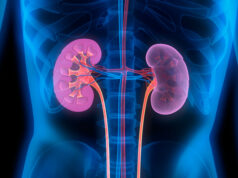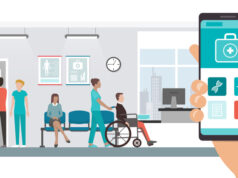
Heart failure affects about 2% to 3% of people globally—including up to 9% of those over 60—and about 6.5 million Americans. For a person with this chronic, progressive condition, the heart isn’t able to pump blood well enough to meet the body’s needs for blood and oxygen, which can have dire consequences. About half of those diagnosed with heart failure die within five years, which is worse than the death rate for common cancers like bladder, prostate and breast cancer.
Early detection and treatment can greatly improve a patient’s prognosis. But frequently people don’t have noticeable symptoms, like swelling of the ankles and shortness of breath, until the condition has worsened. That’s where, research suggests, AI and the smartwatch could help.
Earlier this month, researchers at Mayo Clinic in Rochester, Minnesota presented on preliminary findings at the Heart Rhythm Society conference showing how advances in AI and data from an Apple Watch could be used to detect heart failure. Specifically, they showed how AI could be used to interpret an electrocardiogram, or ECG—which measures the electrical activity of the heart—taken by an Apple Watch to detect what’s called left ventricular dysfunction, or a weak heart pump (a stage of heart failure when often no symptoms are present).
If left ventricular dysfunction is detected early before symptoms develop, clinicians can intervene to significantly improve a patient’s prognosis, according to Dr. Paul Friedman, chair of the department of cardiovascular medicine at Mayo Clinic in Rochester.
“There are a whole slew of treatments that have been demonstrated to be effective in lowering the risk of death,” Friedman said.
Especially when doctors are able to intervene early, he said treatments for heart failure ranging from medications to devices like the pacemaker have been shown to decrease death rates, lower the risk of hospitalization and reduce a person’s risk of developing symptoms.
A total of 2,454 people from 46 states and 11 countries participated in Mayo Clinic’s study and downloaded the study app, developed by the academic medical center. The app sent ECGs recorded by the Smart Watch for clinician review, and many of those were analyzed by AI for the purposes of the study. In total, researchers were able to collect more than 125,000 ECGs in this way in slightly more than five months, said Zachi Attia, Mayo Clinic’s lead AI scientist and co-director of artificial intelligence in its department of cardiovascular medicine.
About 420 patients also had a watch ECG that was recorded within 30 days of also undergoing an echocardiogram, an ultrasound of the heart which is traditionally used to diagnose heart failure. That gave researchers another way to test the accuracy of their algorithm; and although the data is preliminary, using the algorithm to interpret Apple Watch ECGs appears to work as well or better than a tread mill stress test for detecting heart failure, Attia said.
The latest findings by Mayo Clinic researchers will still need to be replicated to confirm the results. But the findings appear to build on Mayo’s earlier research that found AI could be used to interpret an ECG in a clinical setting to detect heart failure.
A standard ECG administered in a doctor’s office uses 12 electrode leads that are placed on a patient’s chest, arms and legs to create what’s called a tracing, which is used to evaluate the heart’s electrical signals. To interpret ECG signals generated from the single lead on an Apple Watch, researchers at Mayo Clinic modified an established 12-lead algorithm used to detect a weak heart pump. That algorithm is licensed to Anumana, an AI-driven health technology company, by nference, which develops software solutions, and Mayo Clinic. It needs FDA approval before it can be used in routine clinical practice.
Pending that approval, David McMullin, chief business officer at Anumana, said it has no direct competitors.
But other companies like Cardiologs are using AI to improve diagnosis of heart conditions. For example, Cardiologs uses AI to detect atrial fibrilliation, a heart rhythm disorder which can increase a person’s risk for heart failure.
For now, an echocardiogram is still traditionally used to diagnose heart failure. But far fewer patients have it done than an ECG, and it’s not cheap. One echocardiogram can cost around $1,500, compared with $100 for a ECG in a doctor’s office, Attia said—or nothing for a ECG from an Apple Watch (apart from the cost of the watch itself and paying for a data plan). So having an algorithm that could detect heart failure using an ECG, and not necessarily having to rely on a echocardiogram by itself is a breakthrough, Attia said.
He sees great promise in using AI and consumer technology to reach far more patients, whose heart failure might not otherwise be detected until much later in the disease course, when the prognosis is poor. Friedman, too, thinks reaching people in the comfort of their home through a wearable could help reduce disparities in care. In this case, it would mean more people could be diagnosed earlier on with a condition that could be life-threatening, he said, and be able to do something about it.
Photo: metamorworks, Getty Images








